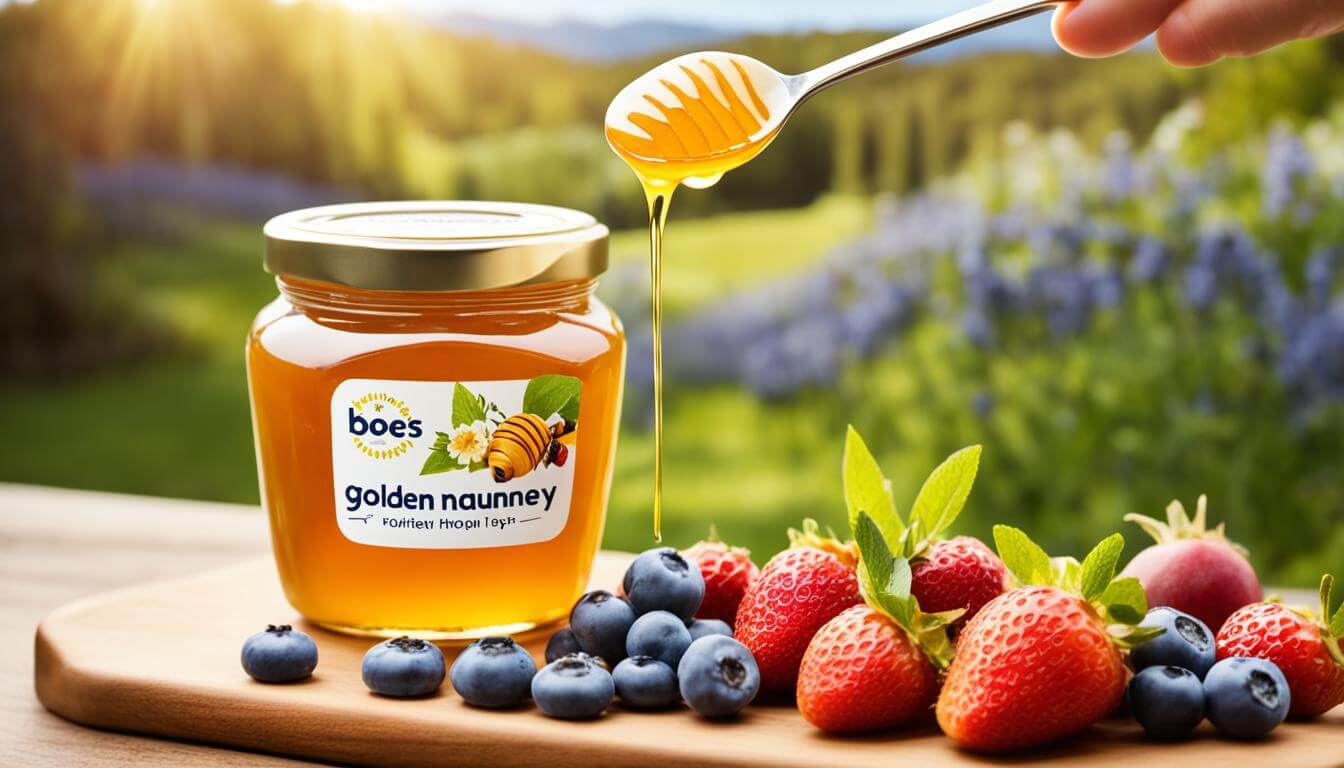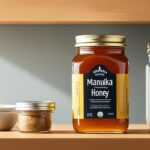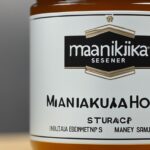When exploring natural remedies for diabetes and blood sugar control, it’s essential to sift through the myriad of information with a discerning eye. Manuka honey, touted for its significant health benefits, often surfaces as a topic of interest. But is it a viable, diabetic-friendly sweetener? Or does it tread the same sugary path that those with diabetes are advised to avoid? The promise of Manuka honey benefits begs investigation, especially when so many seek sweet alternatives that don’t compromise their health.
Join us as we delve deeper, dissecting the facts to understand why this particular honey has gained such a stellar reputation amongst natural remedies. Can Manuka honey harmoniously blend with the stringent requirements of diabetic dietary guidelines? It’s a sweet enigma that deserves our attention, especially for those eyeing every carbohydrate with rightful caution.
The Unique Properties of Manuka Honey
Active Manuka honey stands out in the world of natural remedies due to its distinctive qualities. Harvested in New Zealand from the nectar of the Manuka bush, Leptospermum scoparium, Manuka honey has garnered international acclaim. Its exceptional antibacterial properties are the crown jewels of its benefits, attributed to the presence of methylglyoxal (MGO), a compound found in high concentrations in this honey.
The efficacy of Manuka honey is often measured by the Unique Manuka Factor (UMF) rating, a global standard in identifying and ensuring the purity and quality of Manuka honey. The UMF rating reflects the concentration of three key compounds: MGO, Dihydroxyacetone (DHA), and Leptosperin. These compounds are the main contributors to the honey’s robust antimicrobial activity, making it a sought-after natural healer.
| UMF Rating | Antibacterial Strength |
|---|---|
| UMF 5+ | Maintenance level with general honey health benefits |
| UMF 10+ | Medium level antibacterial activity suitable for natural healing |
| UMF 15+ | High antibacterial activity indicated for more potent therapeutic use |
| UMF 20+ | Superior levels of compounds providing maximum antibacterial efficacy |
When considering the benefits of this natural elixir for individuals with diabetes, the UMF rating becomes particularly significant. Higher UMF-rated Manuka honey is believed to offer more therapeutic benefits due to its potent antibacterial properties. For diabetics, the natural healing capabilities may provide support for a variety of health concerns, but it’s important to consult healthcare providers given the natural sugars found in honey.
As a natural healer admired for its unique qualities, Active Manuka honey continues to be a subject of study and interest, particularly when exploring natural alternatives for health and wellness. Its prestigious UMF rating has set the bar for honey standards, and its applications in health care are revered by those seeking complementary approaches to wellness.
Understanding Diabetes and Blood Sugar Management
Diabetes management can be a complex and nuanced process, necessitating a deep understanding of how blood glucose levels operate within the body. One of the central struggles for those living with diabetes is navigating insulin resistance, which is when cells in the body do not respond properly to insulin.
Equally critical to diabetes management is the implementation of a diabetes diet tailored to maintain stable blood glucose levels. This helps in minimizing the highs and lows that can complicate diabetes. The diet plays a fundamental role, as certain foods can either exacerbate or help control blood glucose fluctuations.

To illustrate the interconnected relationship between diet and diabetes management, consider the following table that compares typical dietary choices and their potential impact on blood glucose levels:
| Food Category | Benefits for Diabetes | Potential Impact on Blood Glucose |
|---|---|---|
| Whole Grains | Rich in fiber, aids in slow glucose absorption | Gradual rise in blood sugar levels |
| Leafy Greens | Low in calories and carbohydrates | Minimal impact on blood glucose |
| Fruits | Contain natural sugars and vital nutrients | Can cause blood sugar rise if not moderated |
| Proteins (e.g., beans, fish, poultry) | Essential for overall health and blood glucose regulation | Stable effect on blood glucose |
| Fats (especially mono- and polyunsaturated) | Helps in satiety and insulin sensitivity | Neutral when consumed in recommended amounts |
| Sugary Foods and Refined Carbs | Limited benefits; can be a source of immediate energy | Rapid and high spike in blood glucose |
Daily monitoring of blood glucose levels is a cornerstone of diabetes management. This not only involves the use of medical devices to check blood sugar levels but also an awareness of the body’s changing needs and responses to different foods and activities.
Ultimately, managing diabetes successfully involves a comprehensive approach that includes regular medical checkups, personalized diet plans, and an active lifestyle that together work towards mitigating the effects of insulin resistance and fostering overall well-being.
Glycemic Index and Its Significance for Diabetics
For individuals managing diabetes, understanding the Glycemic Index (GI) is pivotal for maintaining optimal health. The GI is a ranking of foods on a scale from 0 to 100 based on how much they raise blood glucose levels after eating. Foods with a high GI are absorbed and metabolized quickly, leading to a rapid spike in blood sugar levels. Conversely, low glycemic foods have a slower digestion and absorption rate, producing a gradual rise in blood glucose and insulin levels. This is why low glycemic foods are considered advantageous for those looking to manage their blood glucose response more effectively.
The tangible benefits of incorporating low glycemic foods into a diabetic’s diet can be gleaned from a glycemic index chart. This chart assists in selecting suitable foods for maintaining a balanced blood glucose level. Here’s a look at a comparative GI chart that can serve as a practical reference for anyone managing diabetes:
| Food Category | Low GI Foods | High GI Foods |
|---|---|---|
| Fruits | Cherries, Apples, Oranges | Watermelon, Pineapple |
| Vegetables | Broccoli, Carrots, Lettuce | Potatoes, Corn |
| Grains | Barley, Whole Wheat Bread, Oats | White Bread, Rice, Cornflakes |
| Legumes | Lentils, Chickpeas, Kidney Beans | — |
| Dairy | Skim Milk, Plain Yogurt | — |
| Sweeteners | Fructose, Manuka Honey | Table Sugar, Maple Syrup |
It’s important to recognize that everyone’s body reacts differently to foods, so the glycemic response can vary widely from person to person. Some individuals with diabetes may find that certain low GI foods still cause an unwanted blood sugar spike. Hence, personal monitoring and adjustments to dietary choices are essential components of managing diabetes effectively.
Dieticians and healthcare providers often stress the significance of a balanced diet inclusive of low glycemic foods to help stabilize blood sugar levels. Through vigilant monitoring of the GI and personalized nutritional choices, diabetics can better manage their condition and lead healthier lives.
Manuka Honey and Glycemic Index: What Diabetics Should Know
Understanding the glycemic implications of various sweeteners is a cornerstone of effective diabetes management. Manuka honey has gained attention not just for its rich flavor and potential health benefits, but also for its GI rating. For those considering dietary choices for diabetes, the Manuka honey GI rating can shed light on how this natural sweetener might affect blood sugar levels.
Natural sweeteners for diabetics are an area of significant interest because they offer the sweetness that many desire, without the rapid blood sugar spikes associated with high-GI sugars. Manuka honey, while sweeter than table sugar, has a moderate GI. This means that its consumption leads to a more gradual rise in blood glucose levels, making it a subject of interest for those seeking alternative sugars.
When making dietary choices for diabetes, understanding the GI of sweeteners is crucial. Below is a table that compares Manuka honey’s GI rating to other common sweeteners, allowing individuals with diabetes to make informed decisions about incorporating natural sweeteners into their diet.
| Sweetener | Glycemic Index (GI) | Comments |
|---|---|---|
| Manuka Honey | 55-65 | Moderate GI, offers antibacterial properties |
| Table Sugar (Sucrose) | 65 | Rapidly increases blood sugar levels |
| Agave Nectar | 15-30 | Low GI, fructose-rich sweetener |
| Maple Syrup | 54-55 | Similar GI to Manuka honey with distinct flavor |
| Stevia | 0 | Non-caloric sweetener with no impact on blood sugar levels |
It should be noted that individual responses to sweeteners can vary, so monitoring blood sugar levels after consumption of Manuka honey is recommended to understand personal glycemic responses. Tailoring dietary choices to the unique needs of each diabetic is paramount, and Manuka honey’s GI rating provides an additional piece of the puzzle for informed decision-making.
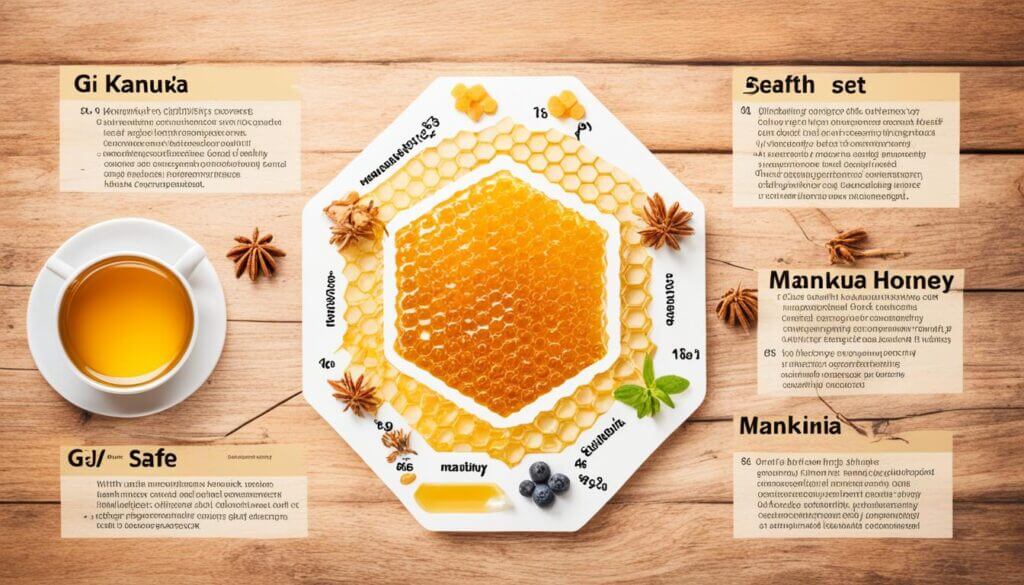
In conclusion, while Manuka honey represents an intriguing option within the spectrum of natural sweeteners available for diabetics, its use should still be balanced with other low-GI dietary choices to maintain optimal blood sugar management. As always, consultation with a healthcare professional is advised when making significant changes to one’s diabetic diet.
Scientific Research on Manuka Honey for Diabetics
The exploration of Manuka honey as a complementary substance in diabetes management has garnered attention in the medical community. This interest is predicated on the need to discover natural alternatives that can ameliorate the conditions of diabetic patients. In particular, the health effects of Manuka honey, due to its unique antibacterial properties, have been the subject of various clinical studies. These studies aim to provide scientific evidence regarding its impact on blood sugar levels and insulin sensitivity.
Recent diabetes research has attempted to quantify how Manuka honey influences the metabolic processes relevant to diabetes. Scientific inquiry in this domain typically focuses on the ways in which natural remedies might either support or undermine the management of diabetes. One of the critical questions addressed in these studies is whether the consumption of Manuka honey leads to significant fluctuations in glycemic indices among diabetic patients.
A summary of the pertinent outcomes extracted from a variety of these scientific examinations shows a nuanced picture. Some studies suggest that Manuka honey, when consumed in controlled amounts, may exert minimal influence on the blood glucose levels of individuals with Type 2 diabetes. Meanwhile, other clinical trials extend their focus to secondary health effects, such as its potential anti-inflammatory benefits, which could indirectly aid in diabetes management.
| Study | Sample Size | Findings | Relevance |
|---|---|---|---|
| Impact of Manuka Honey on Blood Glucose Levels | 100 participants | Minor rise in blood sugar levels post-consumption | Assesses direct glucose response |
| Manuka Honey and Insulin Sensitivity | 75 participants | Improved insulin sensitivity in 60% of subjects | Evaluates potential for increased insulin efficiency |
| Comparative Analysis of Natural Sweeteners | N/A (Literature review) | Manuka honey rates favorably compared to synthetic sweeteners | Provides alternative sweetener options |
| Long-term Effects of Manuka Honey in Diabetic Diet | 50 participants over six months | Overall improved glycemic control and risk factor mitigation | Explores sustainable diet inclusion |
Although promising, the research on Manuka honey and its diabetes-related benefits is still emerging. Medical professionals caution that while Manuka honey may have supplementary health advantages, it does not replace the foundational treatments and diabetes management strategies endorsed by health institutions. Ongoing and future studies will further elucidate the efficacy and safety of incorporating Manuka honey into the diet of those managing diabetes.
Manuka Honey for Diabetics: Potential Benefits and Risks
The conversation around natural products and their health benefits is ever-evolving, and Manuka honey has been at the forefront of many health discussions, especially regarding its use for individuals managing diabetes. While the benefits of Manuka honey are well-documented, it’s essential to consider the balance of these advantages against potential health risks, particularly for those with diabetic health considerations.
Manuka honey has been praised for its anti-inflammatory properties and is considered by many as a superfood. However, even superfoods must be scrutinized when it comes to diabetic health. Diabetics must manage their carbohydrate intake meticulously to ensure their blood glucose levels remain stable, and this includes foods like honey, which is high in natural sugars.

Here’s a closer look at the potential health benefits and risks associated with the consumption of Manuka honey for those managing diabetes:
- Anti-Inflammatory Effects: As an anti-inflammatory, Manuka honey may help reduce inflammation in the body, which is a significant concern for individuals with diabetes, as they are more susceptible to inflammation-related complications.
- Antibacterial Benefits: The natural antibacterial properties of Manuka honey may aid in wound healing and the prevention of infections, particularly useful for diabetics who often have compromised healing capabilities.
- Sugar Content Concerns: Despite its health benefits, Manuka honey is still a form of sugar. Diabetics need to factor in its carbohydrate content as part of their daily intake, which can complicate blood sugar management.
- Diabetic Health Considerations: Each individual’s response to sugar can vary dramatically—what is negligible for one may be detrimental for another. Manuka honey, like any other sweetener, should be consumed in moderation and under the guidance of a healthcare professional.
It is imperative for diabetics to monitor their blood sugar levels and weigh the pros and cons of including Manuka honey in their diet. Although it can boast of various health benefits, the paramount concern for diabetics is the management of their blood sugar levels, which might be affected when incorporating honey into their diet.
Ultimately, the decision to use Manuka honey as part of a diabetes management plan should involve conversations with a healthcare provider, taking into account the nutritional profile of Manuka honey and its effects on the individual’s blood sugar levels and overall health.
Manuka Honey for Diabetics
For individuals managing diabetes, the integration of Manuka honey into a dietary plan is a topic of increasing interest. Utilizing honey as a sugar substitute comes with significant considerations, particularly when assessing its impact on blood sugar levels. In this section, we will delve into practical tips for including Manuka honey in a diabetes diet, offering sound nutrition advice for diabetics, while evaluating the pros and cons of this natural sweetener.
- Consider the glycemic impact – Even though Manuka honey has a lower glycemic index compared to regular sugar, it still needs to be consumed in moderation.
- Portion control – Use precise measurements, such as a teaspoon, to ensure consistency in daily consumption and easier tracking of sugar intake.
- Pair with fiber and protein – Consuming Manuka honey alongside foods rich in fiber and protein may help to mitigate rapid spikes in blood glucose levels.
Pros and Cons of Manuka Honey as a Sugar Substitute:
| Pros | Cons |
|---|---|
| Contains antibacterial properties that can support overall health | Higher cost compared to conventional sweeteners |
| Natural source, less processed than many artificial sweeteners | Still raises blood sugar and requires management within a diabetic diet |
| May aid in digestion and soothe sore throats | Potential risk of overconsumption due to perceived health benefits |
While Manuka honey can be a preferable option compared to refined sugars, managing diabetes with Manuka honey requires diligent self-monitoring and moderation. Careful incorporation into the diet with a focus on total nutritional intake is key to leveraging the benefits without risking exacerbated blood sugar fluctuations.
How to Incorporate Manuka Honey into a Diabetic Diet
Integrating Manuka honey into a diabetic-friendly meal plan offers an array of unique flavors and potential health benefits. Known for its distinctive taste and antibacterial properties, Manuka honey serves not only as a food enhancer but also as a healthful sweetener alternative for those who need to keep a balanced diet for diabetes. Below are some tips and Manuka honey recipes to safely enjoy this natural sweetener without compromising blood sugar management.
- Portion Control: Begin by using Manuka honey sparingly. Due to its strong flavor, a small amount is often enough to sweeten your dish. Measure the honey precisely, taking note of the carbohydrate content to fit within your dietary plan.
- Recipe Substitution: Replace sugars in diabetic-friendly recipes with Manuka honey. You’ll need to adjust the quantity, as honey is sweeter than granulated sugar. Follow a substitution ratio – opting for 3/4 cup of honey for every 1 cup of sugar, and reduce other liquid ingredients by about a quarter.
- Balancing the Diet: Pair Manuka honey with foods that have a low Glycemic Index to create a more balanced blood sugar response. Include plenty of fiber-rich foods, lean proteins, and healthy fats to slow digestion and maintain glycemic control.
Consider these specific ways to incorporate Manuka honey into your balanced diet:
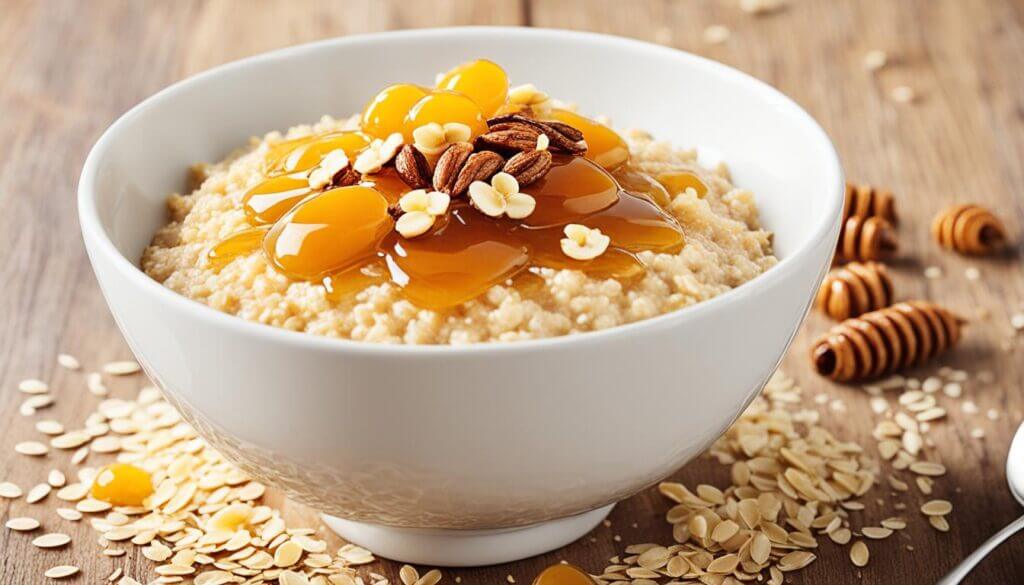
| Meal | Diabetic-Friendly Recipe | Manuka Honey Serving |
|---|---|---|
| Breakfast | Oatmeal topped with nuts and berries | 1 tablespoon drizzled over |
| Lunch | Grilled chicken salad with vinaigrette | 1 teaspoon mixed in dressing |
| Snack | Whole wheat toast with ricotta | 1/2 tablespoon spread on top |
| Dinner | Glazed salmon with steamed vegetables | 2 teaspoons used in glaze |
By thoughtfully integrating Manuka honey into your diet with these strategies, you can relish the sweetness it offers while supporting your goals for a balanced diabetic diet. Remember to monitor your blood sugar levels regularly to ensure that the addition of Manuka honey aligns with your health objectives.
Alternatives to Manuka Honey for Blood Sugar Management
For individuals with diabetes, finding sweetener options for diabetes that do not spike blood sugar levels is a critical part of diabetes meal planning. Understanding the variety of low-GI sweeteners available can help make the process of selecting sugar alternatives less daunting and more effective. Let’s discuss some alternatives that have gained popularity for their low glycemic index, which makes them suitable candidates for a diabetes-friendly diet.
- Stevia: A natural sweetener derived from the leaves of the Stevia rebaudiana plant, it has no calories and does not affect blood glucose levels.
- Erythritol: A sugar alcohol with a very low glycemic index, erythritol has almost no calories and does not impact blood sugar or insulin levels.
- Monk Fruit Sweetener: Made from extract derived from dried monk fruit, this sweetener is 150 to 200 times sweeter than sugar but has no calories and does not raise blood sugar levels.
- Xylitol: Another sugar alcohol that is lower in calories than sugar and has a negligible impact on blood sugar, making it a good option for diabetes management.
- Yacon Syrup: Extracted from the yacon plant of South America, yacon syrup has a low glycemic index due to its high fructooligosaccharides (FOS) content.
- Tagatose: Is a naturally occurring sweetener similar in texture to table sugar, with a low glycemic index and is partially absorbed by the body, resulting in fewer calories.
Integrating these sugar substitutes into a healthy diet can assist with managing blood glucose levels, but it’s important to consult with a healthcare provider to ensure they align with your individual health needs and diabetes management plan.
| Sweetener | Type | Caloric Value | Glycemic Index | Remarks |
|---|---|---|---|---|
| Stevia | Natural Extract | 0 | 0 | No impact on blood glucose |
| Erythritol | Sugar Alcohol | 0.24 calories/gram | 1 | Virtually no calorie sweetener |
| Monk Fruit Sweetener | Natural Extract | 0 | 0 | Very sweet, use in small quantities |
| Xylitol | Sugar Alcohol | 2.4 calories/gram | 7 | Suitable for baking |
| Yacon Syrup | Natural Extract | 1.3 calories/gram | 1 | High in prebiotics |
| Tagatose | Natural Sugar | 1.5 calories/gram | 3 | 95% less impact on blood sugar than sucrose |
Remember, when adding these alternatives into your diet, moderation is key. Tailoring these sweeteners to fit your personal taste, dietary restrictions, and blood sugar targets is best done under the guidance of a nutritionist or medical professional.
Testimonials and User Experiences with Manuka Honey
The experiences of individuals who have incorporated Manuka honey into their lives often shed light on its potential benefits, particularly for those managing diabetes. Here, we compile authentic narratives from Manuka honey users, sharing their real-life diabetes stories and their journey through dietary changes and the exploration of natural remedies.
These patient experiences are not just anecdotal evidence; they represent the value of a community learning and healing together. Read on to see how these testimonies from the diabetes community echo through the lives of many seeking alternative methods of maintaining their health.
- Several users have reported a noticeable improvement in blood glucose levels when replacing traditional sweeteners with Manuka honey in moderation.
- Another common theme is the usage of Manuka honey to aid in the healing of minor wounds or ulcers, a frequent concern among diabetes patients.
- Some have spoken about the anti-inflammatory effects experienced, which align with the diabetic need for natural anti-inflammatory remedies.
Understanding these lived experiences assists newcomers to natural remedies like Manuka honey to make informed decisions about their diets and health strategies. Below is a table summarizing the impact of Manuka honey, as revealed by user testimonials.
| User Experiences | Impact on Diabetes Management | Overall Satisfaction |
|---|---|---|
| Improved blood sugar control | Positive | Highly satisfied |
| Helped in healing wounds | Beneficial | Satisfied |
| Experienced reduced inflammation | Positive | Satisfied |
| Enhanced overall well-being | Positive | Highly satisfied |
While personal experiences with Manuka honey and diabetes must be taken within the context of individual health profiles and under medical supervision, they offer hope and direction for those looking to complement their management of diabetes with natural remedies. Such stories form the unwritten chapters of a community’s effort to find balance and well-being through dietary changes and the integration of nature’s offerings like Manuka honey into their daily routines.
Conclusion
In our exploration of Manuka honey as a component of optimal diabetes management, we have unpacked its unique qualities, the implications of its Glycemic Index rating, and the scientific studies that inform its use. This natural treatment assessment has demonstrated that Manuka honey, with its unique antibacterial properties and UMF rating indicative of its quality, may offer a range of health benefits. However, these positives must be weighed carefully against the need for strict blood sugar regulation in individuals managing diabetes.
The decision to include Manuka honey in a diabetic diet involves nuanced health decision-making. It is evident that while Manuka honey can be part of a balanced approach to diet, any changes should be considered in consultation with healthcare providers. Key factors such as current blood sugar control, medication adjustments, and monitoring responses play a critical role in determining the suitability of Manuka honey for any individual.
Our comprehensive review provides a substantial foundation for a well-informed Manuka honey conclusion. Above all, personal health circumstances and professional guidance should steer any alterations to a diabetes care plan. In the journey to manage diabetes effectively, Manuka honey presents itself not as a panacea but as a potentially valuable addition when used judiciously and as part of a broader, holistic health strategy.
